Home / Workouts & Reviews / Arnold Schwarzenegger’s Blueprint To Cut Review
Arnold Schwarzenegger’s Blueprint To Cut Review
01/03/2021share
tweet
share
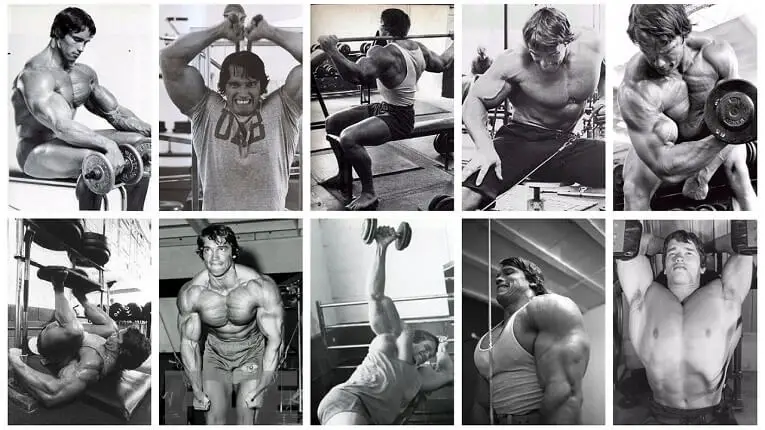
Arnold Schwarzenegger’s Blueprint to Cut Review
Today:
If you Google “how to build muscle and burn fat” you’ll be presented with 33,700,000 results, the option to buy multiple fat burning supplements and a host of other tips and tricks which will ultimately build the same amount of muscle as joining a country group dance at Center Parcs.
A complete waste of time.
However,
If you go back to the 1970’s, the options were unquestionably far more limited.
Walking into a local gymnasium, you would’ve likely been met with the smell of sweat, rust and the music of weights crashing on the floor (and not Ministry of Sound’s remix of Justin Bieber’s latest single).
If that wasn’t enough:
The loud grunts of men deadlifting over 500lbs, screaming at one another and generally just putting in ‘real work’ would fill the weight room everywhere you looked.
This was what training in Arnold Schwarzenegger’s era looked like.
Sadly,
This has been completely lost today with the noise of conflicting advice on the internet, science weighed down in complexity and the supplement industry constantly trying to selling you a bag of shit.
With that said,
We’ll be taking a look at Arnold Schwarzenegger’s Blueprint to Cut, a ‘Golden Era’ workout which he would routinely perform before competitions in order to build muscle and burn fat to ensure his physique was primed to win championships.
In other words:
A real training plan which is designed to get you real results.
Let’s get into it.
Overview
Arnold’s Blueprint to Cut is an 8 week programme designed to increase muscle mass, improve muscle definition and torch fat.
It is broken down into two phases which consist of 3 workouts that are performed twice per week over the course of 6 days, followed by 1 day of rest.
Blueprint to Cut is split into the following workouts:
- Chest and Back
- Legs and Abs
- Shoulders and Arms
Arnold’s Blueprint to Cut, like Blueprint to Mass is predicated on high-volume, body part split routines in order to create a well-rounded, championship-winning physique that successfully creates definition and separation between every major muscle group.
Arnold states:
“By splitting it up into training each body part twice per week you’re really allowing yourself a chance to enjoy maximal gains.
Throw in your meal and supplementation plan, and the results are going to get even better.
In fact, I’m confident the results could be unreal for you. This combination could really take your body to a level you didn’t think was possible. The volume, short amount of rest and huge number of super-sets and tri-sets make it really happen when it comes to the workouts.
This type of training really clicked for me and I think it will do the same for you.“
Of course:
Training for a physique that is the stuff of champions requires a workout which will push you to your limits, and Arnold’s Blueprint to Cut takes no prisoners.
Supersets, tri-sets and giant sets are the menu of the day (everyday) so this plan is strictly for advanced lifters only.
If you are just starting out in your fitness journey, consider performing Arnold Schwarzengger’s Home Workout for a few months before lifting weights.
For the experienced beginner or intermediate lifter, performing a few cycles of Arnold Schwarzenegger’s Golden Six, Vince Gironda’s 8×8 or Jim Stoppani’s Shortcut to Shred workouts should be completed first before attempting this plan.
It’s important you can perform basic movements such as the bench press, squat, deadlift and barbell curls with good technique to avoid the risk of injury (particularly when you are performing supersets and fatigue is setting in).
However,
For those who are ready for this plan, check out the full overview below.
Arnold Schwarzenegger’s Blueprint to Cut Workout
Phase 1 – Week 1 to 4
Monday: Chest and Back
| Exercise | Sets | Reps |
|---|---|---|
| Bench Press (superset with following exercise) | 1 | 30, 10, 10, 10, 10, 5 |
| Wide-Grip Chin Ups | 6 | 10 |
| Incline Barbell Bench Press (superset with following exercise) | 5 | 8 |
| T-Bar Rows | 5 | 10 |
| Flat Dumbbell Flyes (superset with following exercise) | 5 | 12 |
| Seated Cable Rows | 5 | 12 |
| Dips (superset with following exercise) | 4 | 10 |
| Close-Grip Chin Ups | 4 | 10 |
| Dumbbell Pullovers (superset with following exercise) | 3 | 12 |
| Cable Crossovers | 3 | 12 |
Tuesday: Legs
| Exercise | Sets | Reps |
|---|---|---|
| Squats | 8 | 12 |
| Leg Extensions | 10 | 10 |
| Leg Curls | 10 | 10 |
| Standing Calf Raises | 10 | 10 |
Wednesday: Arms
| Exercise | Sets | Reps |
|---|---|---|
| Barbell Curls (superset with following exercise) | 5 | 12 |
| Skullcrushers | 5 | 15 |
| Dumbbell Hammer Curls (superset with following exercise) | 5 | 12 |
| Straight Bar Pushdowns | 5 | 20 |
| Incline Alternating Dumbbell Curls (superset with following exercise) | 3 | 6 |
| Overhead Rope Press | 3 | 15 |
| Concentration Curl (superset with following exercise) | 5 | 12 |
| 1-Arm Kickback | 5 | 12 |
Thursday: Chest and Back
| Exercise | Sets | Reps |
|---|---|---|
| Bench Press (superset with following exercise) | 1 | 30, 10, 10, 10, 10, 5 |
| Wide-Grip Chin Ups | 6 | 10 |
| Incline Barbell Bench Press (superset with following exercise) | 5 | 8 |
| T-Bar Rows | 5 | 10 |
| Flat Dumbbell Flyes (superset with following exercise) | 5 | 12 |
| Seated Cable Rows | 5 | 12 |
| Dips (superset with following exercise) | 4 | 10 |
| Close-Grip Chin Ups | 4 | 10 |
| Dumbbell Pullovers (superset with following exercise) | 3 | 12 |
| Cable Crossovers | 3 | 12 |
Friday: Legs
| Exercise | Sets | Reps |
|---|---|---|
| Squats | 8 | 12 |
| Leg Extensions | 10 | 10 |
| Leg Curls | 10 | 10 |
| Standing Calf Raises | 10 | 10 |
Phase 2 – Week 5 to 8
Monday: Chest, Back and Abs
| Exercise | Sets | Reps |
|---|---|---|
| Decline Bench Sit Ups | 1 | 3-5 minutes |
| Deadlifts | 1 | 10, 8, 6 |
| Weighted Chin Ups (superset with following exercise) | 1 | 15, 12, 8, 6, 4 |
| Incline Barbell Bench Press | 1 | 15, 12, 8, 5, 3 |
| Bench Press (superset with following exercise) | 1 | 15, 12, 8, 6 |
| Chin Ups | 4 | Failure |
| Dumbbell Flyes (superset with following exercise) | 4 | 28 |
| Bent Over Rows | 4 | 12 |
| Dumbbell Pullovers (superset with following exercise) | 5 | 15 |
| Dips (superset with following exercise) | 5 | Failure |
| Cable Crossovers | 5 | 15 |
| Hanging Straight Leg Raises | 1 | 20 |
| Hanging Knee Ups | 1 | 20 |
| Crunches | 1 | 50 |
| Seated Leg Tucks | 1 | 30 |
| Stick Twist | 1 | 100 |
Tuesday: Legs and Abs
| Exercise | Sets | Reps |
|---|---|---|
| Decline Bench Sit Ups | 1 | 3-5 minutes |
| Leg Extensions (superset with following exercise) | 5 | 12 |
| Squats | 5 | 20 |
| Front Squats (superset with following exercise) | 4 | 12 |
| Leg Curls | 4 | 12 |
| Leg Press (superset with following exercise) | 3 | 15 |
| Leg Curls | 3 | 1-10 Method |
| Straight Leg Deadlifts | 3 | 6 |
| Donkey Calf Raises (superset with following exercise) | 3 | 15 |
| Standing Calf Raises (superset with following exercise) | 3 | 10 |
| Seated Calf Raises | 3 | 15 |
| Hanging Straight Leg Raises | 1 | 20 |
| Hanging Knee Ups | 1 | 20 |
| Crunches | 1 | 50 |
| Seated Leg Tucks | 1 | 30 |
| Stick Twist | 1 | 100 |
Wednesday: Shoulders, Arms and Abs
| Exercise | Sets | Reps |
|---|---|---|
| Decline Bench Sit Ups | 1 | 3-5 minutes |
| Barbell Press (superset with following exercise) | 4 | 12 |
| Cable Side Laterals (superset with following exercise) | 4 | 12 |
| Lying Side Laterals | 4 | 12 |
| Front Dumbbell Raises (superset with following exercise) | 4 | 10 |
| Rear Delt Raises | 4 | 10 |
| Barbell Curls (superset with following exercise) | 4 | 1-10 Method or 28 |
| Close Grip Straight Bar Pushdowns | 4 | 10 |
| Preacher Curls (superset with following exercise) | 4 | 12 |
| Skullcrushers (superset with following exercise) | 4 | 28 |
| Reverse Preacher Curls | 4 | 12 |
| Concentration Curls (superset with following exercise) | 4 | 12 |
| Standing One Arm Rope Pushdowns | 4 | 12 |
| Reverse Wrist Curls | 3 | 15 |
| Wrist Curls | 3 | 15 |
Thursday: Chest, Back and Abs
| Exercise | Sets | Reps |
|---|---|---|
| Decline Bench Sit-Ups | 1 | 3-5 minutes |
| Deadlifts | 1 | 10, 8, 6 |
| Weighted Chin Ups (superset with following exercise) | 1 | 15, 12, 8, 6, 4 |
| Incline Barbell Bench Press | 1 | 15, 12, 8, 5, 3 |
| Bench Press (superset with following exercise) | 1 | 15, 12, 8, 6 |
| Chin Ups | 4 | Failure |
| Dumbbell Flyes (superset with following exercise) | 4 | 28 |
| Bent Over Rows | 4 | 12 |
| Dumbbell Pullovers (superset with following exercise) | 5 | 15 |
| Dips (superset with following exercise) | 5 | Failure |
| Cable Crossovers | 5 | 15 |
| Hanging Straight Leg Raises | 1 | 20 |
| Hanging Knee Ups | 1 | 20 |
| Crunches | 1 | 50 |
| Seated Leg Tucks | 1 | 30 |
| Stick Twist | 1 | 100 |
Friday: Legs and Abs
| Exercise | Sets | Reps |
|---|---|---|
| Decline Bench Sit Ups | 1 | 3-5 minutes |
| Leg Extensions (superset with following exercise) | 5 | 12 |
| Squats | 5 | 20 |
| Front Squats (superset with following exercise) | 4 | 12 |
| Leg Curls | 4 | 12 |
| Leg Press (superset with following exercise) | 3 | 15 |
| Leg Curls | 3 | 1-10 Method |
| Straight Leg Deadlifts | 3 | 6 |
| Donkey Calf Raises (superset with following exercise) | 3 | 15 |
| Standing Calf Raises (superset with following exercise) | 3 | 10 |
| Seated Calf Raises | 3 | 15 |
| Hanging Straight Leg Raises | 1 | 20 |
| Hanging Knee Ups | 1 | 20 |
| Crunches | 1 | 50 |
| Seated Leg Tucks | 1 | 30 |
| Stick Twist | 1 | 100 |
Saturday: Shoulders, Arms and Abs
| Exercise | Sets | Reps |
|---|---|---|
| Decline Bench Sit Ups | 1 | 3-5 minutes |
| Barbell Press (superset with following exercise) | 4 | 12 |
| Cable Side Laterals (superset with following exercise) | 4 | 12 |
| Lying Side Laterals | 4 | 12 |
| Front Dumbbell Raises (superset with following exercise) | 4 | 10 |
| Rear Delt Raises | 4 | 10 |
| Barbell Curls (superset with following exercise) | 4 | 1-10 Method or 28 |
| Close Grip Straight Bar Pushdowns | 4 | 10 |
| Preacher Curls (superset with following exercise) | 4 | 12 |
| Skullcrushers (superset with following exercise) | 4 | 28 |
| Reverse Preacher Curls | 4 | 12 |
| Concentration Curls (superset with following exercise) | 4 | 12 |
| Standing One Arm Rope Pushdowns | 4 | 12 |
| Reverse Wrist Curls | 3 | 15 |
| Wrist Curls | 3 | 15 |
Phase 1
Similar to Blueprint to Mass, Blueprint to Cut relies on a number of different training methods to increase intensity and prevent plateaus.
For instance, during Phase 1 Week 3 of the programme, you are required to test your ‘one rep max (1RM)‘ on your bench press.
Equally,
When performing the flat dumbbell flyes and dumbbell bent over lateral raises, you’ll need to perform the ‘running the rack‘ method during your last set to torch those extra calories.
The ‘stripping method/shocking principle‘ otherwise known as drop sets will also be called upon during your last set of dumbbell hammer curls, leg extensions and leg curls.
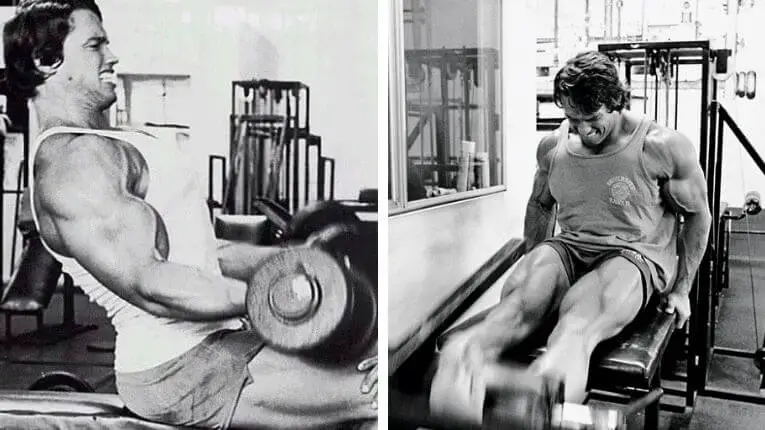
Phase 2
During Phase 2 Week 6, once again, you’ll need to test your ‘one rep max (1RM)’ on the bench press.
‘Running the rack’ will need to be called upon when performing your final set of front dumbbell raises and skullcrushers.
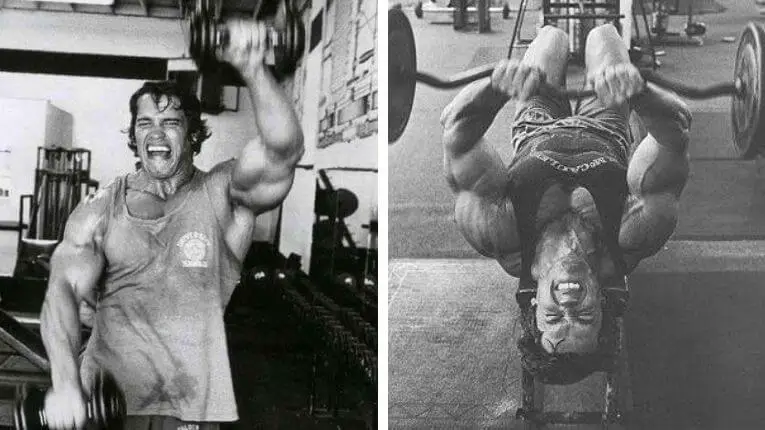
‘1-10 Method‘ can be used when doing barbell curls and the ‘stripping method/shocking principle’ should be implemented when you are on your final set of incline barbell bench press.
On Mondays, Tuesdays, Thursdays and Fridays where training abs has a greater focus, the following exercises are to be performed in one giant set (i.e. rotating between each with no rest in between):
- Hanging Straight Leg Raises
- Hanging Knee Ups
- Crunches
- Seated Leg Tucks
- Stick Twist
There are also various other training principles that you’ll have to utilise during Phase 1 and 2 which we’ll cover in a bit more detail in the notes section of this article.
For more information on the training plan, you can download the full PDFs below:
Arnold Schwarzenegger’s Blueprint To Cut: Phase 1 – [Free PDF] Download
Arnold Schwarzenegger’s Blueprint To Cut: Phase 2 – [Free PDF] Download
You can also watch Arnold giving further insight into his Blueprint to Cut below.
Examination
Arnold’s Blueprint to Cut intelligently targets each muscle group twice a week which is a fantastic way to train in order to build lean muscle mass.
If that wasn’t enough:
The overall volume thrown in the mix through additional training methods, supersets, tri-sets and giant sets will make it almost impossible to plateau on this routine.
Throughout the 8 weeks, each workout will vary from the last so your muscles will have a very difficult time catching on.
Overall, this means more gains for you to enjoy.
Better still:
The reduced rest periods and cardio at the end of each workout will fire up your metabolism and build up your stamina/endurance levels to unprecedented levels.
This will ensure you’re really adding definition to your physique like a sculpture by Michelangelo during the High Renaissance.
Of course,
The primary aim of Blueprint to Cut is to force muscle growth whilst shredding fat following a break from your normal mass building routine.
This is achieved by shocking your muscles from stagnation with additional stimulation for a short, intense period.
In that respect, Arnold Schwarzenegger’s Blueprint to Cut bears many resemblances to other transitory-type routines such as Jim Stoppani’s Shortcut to Shred.
And, as with such routines…
You must be willing to bust your balls, but the rewards will be well worth the effort.
Your muscles will have no other option but to re-adjust to the extreme stress you are placing on them which can only be a good thing.
Notes
Cycle
Arnold Schwarzenegger’s Blueprint to Cut is performed on an 8 week cycle predicated on six workouts a week with one rest day on Sunday.
Throughout the plan, you will be targeting each muscle group twice a week with the exception of abs in Phase 2 which are trained daily between weeks 5 – 8.
Duration
Throughout the Blueprint, you are expected to rest for 30 – 45 seconds between each set with the workout lasting no longer than 1.5 – 2 hours.
As there are fewer changes in reps compared to Arnold’s Blueprint to Mass (meaning fewer changes in weight required between each set), you’ll be able to move onto the next set as quickly as possible, bringing down the total time to complete each workout.
Weight Selection
As explained in Blueprint to Mass, it is important to select the right weight when performing an exercise.
Your ability to perform an exercise with near-perfect technique is always a good indicator as to whether you’re going too light or too heavy.
As Blueprint to Cut entails a lot of volume, the risk of injury is a lot higher.
Thus,
You’ll want to ensure you’re lifting a weight that is not only comfortable on the joints, but also challenges you physically in order to promote muscle hypertrophy.
If you’re no stranger to the gym, ideally you should already have an idea of what your one rep max (1RM) is for each exercise.
The below is a guide of what you should be aiming to lift based on the amount of reps prescribed in the plan:
- 30 reps – 25% of 1 Rep Max
- 25 reps – 50% of 1 Rep Max
- 20 reps – 60% of 1 Rep Max
- 15 reps – 65% of 1 Rep Max
- 12 reps – 70% of 1 Rep Max
- 10 reps – 75% of 1 Rep Max
- 8 reps – 80% of 1 Rep Max
- 6 reps – 85% of 1 Rep Max
- 5 reps – 87% of 1 Rep Max
- 4 reps – 90% of 1 Rep Max
- 3 reps – 93% of 1 Rep Max
The above should only be used as a barometer depending on how many reps are required for a specific exercise.
It is crucial to listen to your body at all times and drop the weight down further if you’re unable to meet these guidelines.
Wide-Grip Chin Ups
The wide-grip chin ups are to be performed with your bodyweight in the required set and rep ranges.
However,
You can perform these with weights if you feel using your bodyweight is too easy.
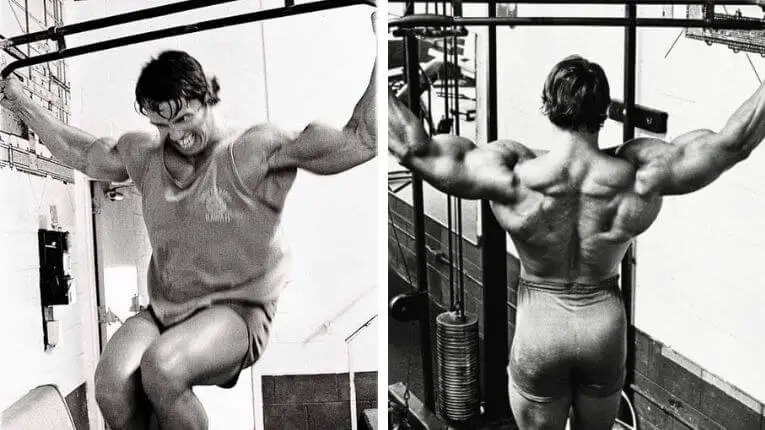
Dips
Similar to the wide-grip chin ups, dips are to be performed using your bodyweight.
Of course,
If this is too easy, adding weights will help increase the difficulty in order to promote greater muscle growth.
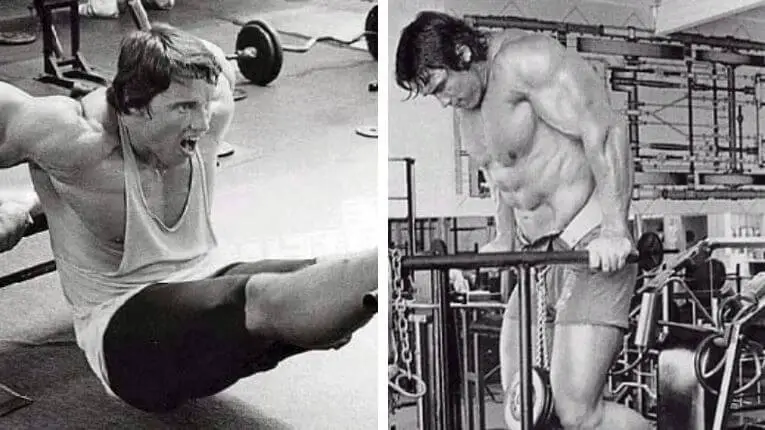
Decline Bench Sit Ups
This exercise is to be performed at the start of every workout during Phase 2 of the plan.
No pre-determined sets or reps, just all out AMRAP (as many rep as possible) for 3 – 5 minutes.
Whilst Arnold is pictured below holding a weighted plate against his upper torso, I would advise you to keep this exercise to bodyweight only.
Performing decline bench sit ups for 3 – 5 minutes will feel like an eternity.
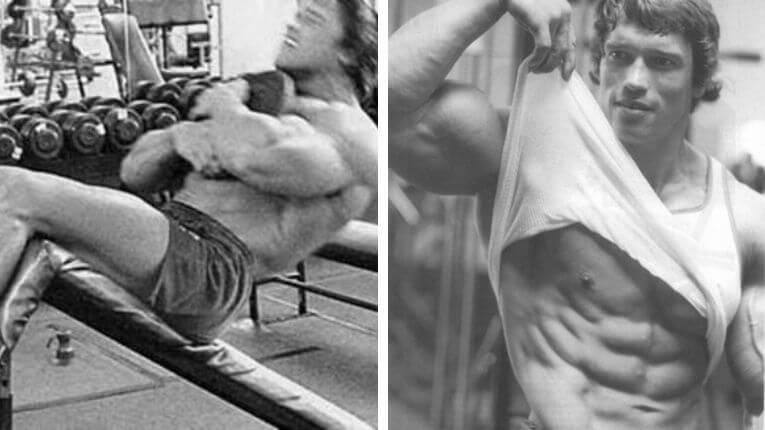
Barbell Press
The barbell press is to be performed by first pressing the bar in front of your head, lowering the bar towards the back of your head and pressing back up to the front.
When alternated between the front and back of your head, that is one rep. You then repeat this movement for the desired reps.
This exercise is otherwise known as the ‘Bradford Press’ and is a great exercise to hit the primary muscles of the deltoids and improving overall shoulder mobility.
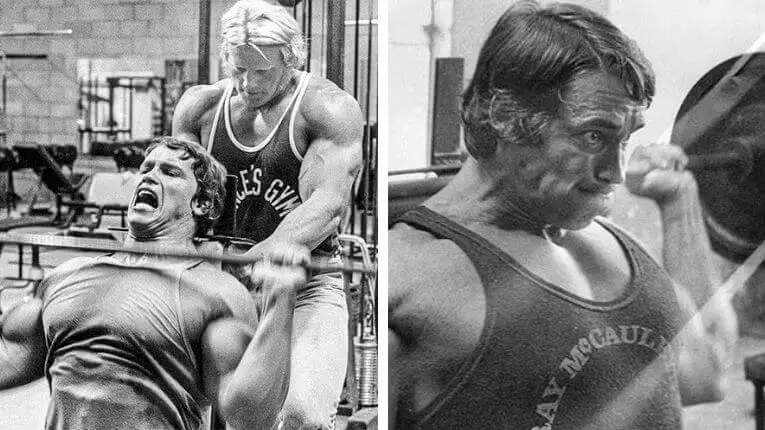
Deadlifts
During Phase 2, performing deadlifts are to be done on alternate days throughout the final 4 weeks.
For instance,
You would do deadlifts during Week 1 on Monday, followed by Week 2 on Thursday and so on until you’ve completed the phase.
When performing straight leg deadlifts, these are to be done once a week only.
Depending on how you feel, these can be performed on either Tuesdays or Fridays.
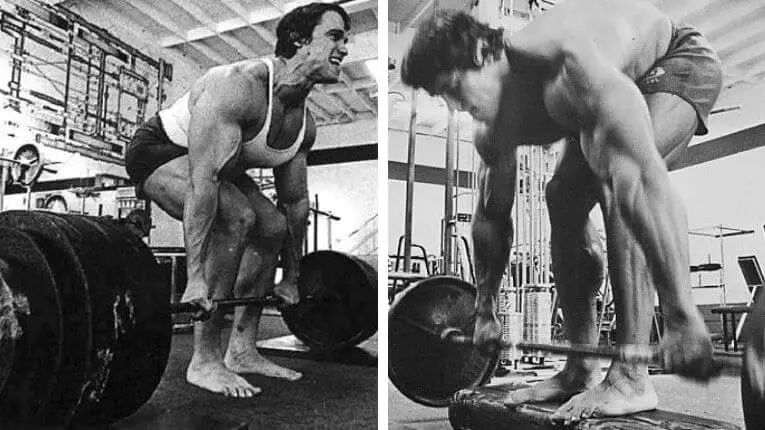
1/4 Rep Method
The 1/4 rep method is a simple, yet effective training method to increase intensity to give you a ridiculous pump.
This is performed by completing one full-range repetition of an exercise followed by lifting or lowering the weight a quarter of the way up or down (depending on which exercise you are performing), to which you finish the movement by reverting back to a full-range repetition.
Performing the movement in this sequence equals one rep, to which you complete the exercise in the prescribed number of sets and reps to really shock your muscles.
The exercises in Blueprint to Cut you should be using this method on are as follows:
Phase 1
- T-Bar Rows
- Leg Curls
- Straight Bar Pushdowns
Phase 2
- Leg Extensions (last set only)
- Rear Delt Raises
Check out the below video of how to perform this method using leg extensions as an example:
28 Method
The 28 method is an additional shocking principle Arnold kept up his sleeve to really turn the pressure on.
This method is done by performing 7 consecutive reps of a chosen exercise in 4 different ways.
In total, you’ll perform 28 killer reps in one giant set without any breaks in between (hence the name).
You’ll perform 7 normal full-range reps, 7 extra slow full-range reps, followed by 7 half reps on the concentric (positive) portion of the lift and 7 half reps on the eccentric (negative) aspect of the lift.
Performing this training principle will send your muscles into stupefaction and is a great way to break plateaus and force any stubborn muscles to grow that bit more.
However:
You’ll need to leave your ego at the door and drop the weight down drastically.
This will be neigh on impossible to perform using your normal poundage.
As a recommendation, you should be using a weight that is at least 25% – 28% of your 1RM.
The exercises you should be using this method on are the following:
Phase 2
- Barbell Curls
- Dumbbell Flyes
Check out the below video of how to perform this method using barbell curls.
5-Count Method
As the name suggests, the 5-count method is performed by slowing down your reps and counting to 5 during the concentric (positive) and eccentric (negative) aspect of the lift respectively.
By slowing down the tempo of your reps, you are effectively placing your working muscle under ‘time under tension’.
This is a training principle to increase the window of time during which the muscles are working to move the weight.
Because of this,
You’ll be increasing the scope of muscle growth by placing the working muscle under additional stress in order to complete the movement.
When performing this method, it’s important to not go as heavy as you normally would in order to perform the lift.
The effectiveness of this training principle is in the time it takes to complete one rep, so you won’t be able to perform it efficiently by going heavy.
By going heavy, you’ll likely begin cheating and using momentum to lift the weight when it gets difficult which isn’t the purpose of this method.
The exercises you should be using the 5-count method on are the following:
Phase 1
- Standing Calf Raises (3 sets only)
- Barbell Curls (last 6 reps)
- Incline Alternating Dumbbell Curls
Phase 2
- Donkey Calf Raises
- Standing Calf Raises
- Seated Calf Raises
- Lying Side Laterals
Check out the below video of Jim Stoppani explaining this method in a bit more detail using dumbbell curls as an example:
Cardio
Believe it or not,
As part of the Blueprint to Cut programme, Arnold prescribes performing cardio after most workouts.
For a 6’1 behemoth weighing 250lbs with 22-inch biceps, it’s hard to believe cardio was a focus for the 7x Mr Olympia winner.
However,
It’s been well documented that Arnold would perform some form of cardio during his pre-competition cutting phases.
He recommends running between 1 or 2 miles at max speed at least 3 – 5 times a week after your workout.
In a Reddit post, Arnold mentioned:
“My favourite form of cardio when we worked out at Gold’s was to run down to the beach and run in the sand after I finished lifting. Today, I don’t run, but I still ride my bike through Santa Monica and Venice. Or I do interval-style training on a stationary bike.”
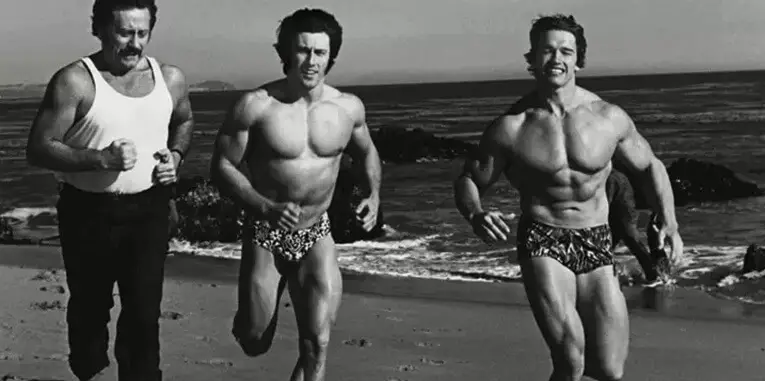
Of course:
When you live by Venice beach, performing cardio is far less of a chore.
Particularly in the UK where you’re likely living in a concrete jungle and will be greeted by all four seasons in one day, going for a run consistently will likely be a struggle.
Nevertheless,
Effective cardio includes a number of things, namely: reducing joint damage, clocking up miles and progression.
If you maintain a consistent tempo and add miles, or you set your distance and increase your tempo, you’ll be making good progress regardless of the form of cardio being performed.
So:
If you don’t have the luxury of a sandy beach on your doorstep, performing cardio on a treadmill, rowing machine or stationary/assault bike will be just as effective.
Nutrition and Supplements
The Blueprint to Cut meal plan has been carefully designed to ensure that not only are you getting enough protein to recover effectively after every workout, but that you’re also adding as much lean muscle mass as possible.
You’ll be eating up to 3,500 calories a day which will only consist of whole, unrefined foods so that you’re not adding any unnecessary fluff onto your frame.
The workouts are long and intense, so it’s important you’re fuelling your body the right way as you’ll need all the energy you can get.
As a barometer,
You should be eating at least 1 gram of protein per pound of bodyweight daily.
For instance:
If you currently weigh 85kg (187lbs), you should be aiming to eat at least 187g of protein each day.
If you read our Blueprint to Mass review, you would’ve recalled Arnold prescribing five meals a day to get in the required calories.
This will still be a requirement in Blueprint to Cut as well (with a few low fat options thrown in the mix).
Below is the full meal plan.
Meal 1 – 2 Hours After Workout:
- 4 whole eggs
- 1/4 cup of oats
Meal 2:
- 8 – 10oz grilled meat
- 3 cups of mixed vegetables
- 1 serving of almonds
Meal 3:
- 2 cups of non-fat cottage cheese
- 1 serving almonds
Meal 4:
- 8 – 10oz grilled meat
- 3 cups of mixed vegetables
Meal 5:
- 2 scoops of whey protein
- 8 – 12oz of water
Regarding what supplements to take, Blueprint to Cut alongside Blueprint to Mass were sponsored by MusclePharm.
An unreputable, shoddy and downright low quality sports nutrition company which resulted in Arnold terminating (no pun intended) his partnership with them.

Therefore:
We won’t be promoting their specific supplements in this article (or our website for that matter).
However,
The supplements the plan prescribes are the following:
- Fat burner
- Multi-vitamin
- Pre-workout formula (preferably containing caffeine, amino acids and creatine)
- Whey protein
- Slow release casein
Personally:
I’d steer clear of taking fat burners.
The research on their effectiveness is inconclusive to say the least and you’d be far better off saving your money by really honing in on your training to burn any excess calories and watching your calorie intake.
There is a very little a supplement can do to speed up this process as fat loss consists of many moving parts (namely being in a calorie deficit and burning more calories than you consume).
For the remaining supplements, you should look to guzzle down a good quality whey protein shake before starting your day, followed by taking a pre-workout before you hit the gym.
After your training session, enjoy another protein shake and get the first meal of the day in you. This should be taken with a good multi-vitamin.
Your fifth meal of the day should be yet another protein shake and you should round off the day by taking some form of slow-releasing protein (such as casein) before you go to bed.
We’ve reviewed a few quality options here which we can certainly vouch for.
If you’re unable to find a suitable product, a few brands we’d highly recommend you shop from include:
Alternatively, if you are a vegetarian or vegan, Myvegan are a decent alternative.
Recovery
Training hard and having a great diet will all be a waste of your time if you aren’t getting the required sleep your body needs to fully recover.
It goes without saying:
You should be aiming to get at least 8 hours of uninterrupted sleep every single night to ensure your muscles and nervous system are given the necessary time to repair and replenish itself.
A lack of sleep can be detrimental to your progress, so ensure you have established a good night routine to help you doze off.
Impression
Arnold’s Schwarzenegger’s Blueprint to Cut is an advanced workout with a hell of a lot of volume (bearing in mind The Governator used anabolic steroids).
If your typical workout is essentially an hour of scrolling through Instagram (which Arnie calls ‘Mickey Mouse stuff’) coupled with a few bicep curls and sit ups thrown in when your gym crush looks your way, then you’re in for a rude awakening.
Two weeks of this workout will be living proof that a sadistic demon presides over the weight room where the sight of another barbell will undoubtedly make you hate yourself.
However,
It’s important to go easy on yourself due to the level of volume/intensity required in order to really shock your muscles week in, week out.
Listening to your body is key if you are looking to perform this routine without the aid of performance-enhancing drugs.
You will no doubt come across days where you can no longer ‘shock’ your muscles as they will be sore and fatigued from the previous day’s workout.
Thus,
With any workout that places high stress on the body, it’s important to re-affirm that lifting weights does not make you big and strong; recovering from lifting weights makes you big and strong.
If you physically cannot move a body part through its normal range of motion and you feel like you’ve been run over by a truck, don’t be a cunt and crawl your way to the gym, take an extra day off.
You’ll re-charge your batteries as you need and avoid the risk of long-term injuries.
Of course, you’ll need to assess your lifestyle if this is a persistent issue.
Make sure you’re getting enough calories, protein and vital nutrients to fuel growth, and that you’re getting at least eight hours of good quality sleep every single night.
If these factors aren’t in place, it doesn’t how much volume you’re working through, you won’t make any significant progress.
In terms of strength,
Whilst performing this routine, there weren’t any noticeable strength gains I made unlike in Blueprint to Mass.
Understandably, the plan is geared towards cutting and improving definition as opposed to building strength despite having to test your 1RM on the bench press during certain intervals in the plan.
If anything:
The ridiculous volume helped toughen me up mentally and I was able to improve my overall body composition due to the sheer amount of calories being burned.
Whilst I did experience some noticeable muscle growth (mainly on the chest, shoulders and arms, it wasn’t anything crazy so don’t expect fast results.
Others might respond differently to this plan than me, but personally, I found it was a good routine to perform to move past inertia and try something completely different.
Conclusion
To summarise:
Arnold’s Blueprint to Cut is a great routine to force growth and improve muscle definition.
Use it to dial up intensity for a few weeks to promote greater muscle mass and help shape and define any lagging areas on your body.
Even if you find yourself short on time to complete Blueprint to Cut, you can still employ the training methods of this routine (with some improvisation) to push your body out of it’s normal routine with a few weeks of high intensity, high volume training.
Are you guilt of hitting your muscles with same old song and dance every week?
Then it’s time to shock the shit out of them with Arnold’s Blueprint to Cut.
What Do You Think?
Have you tried Arnold Schwarzenegger’s Blueprint to Cut?
Have any questions?
Let us know in the comments section below!

Joseph is the Founder and Editor in Chief of CheckMeowt. When he is not sat at the computer guzzling down the nearest thing with protein in it, he can be found pulling up the world in the gym. Occasionally, he is best described as socially unreliable and easily distracte.



